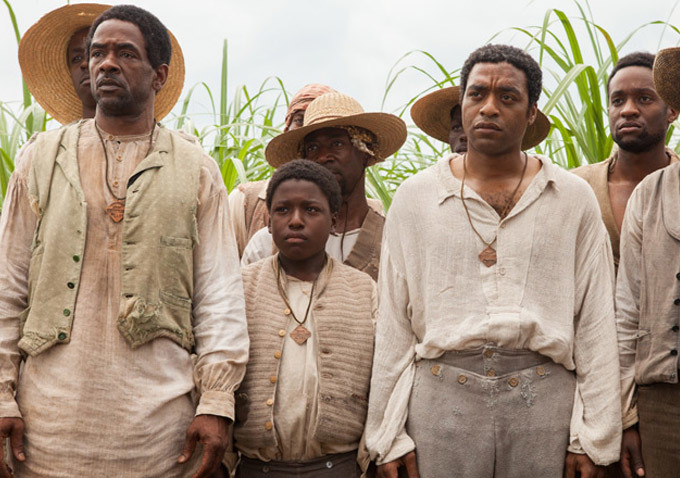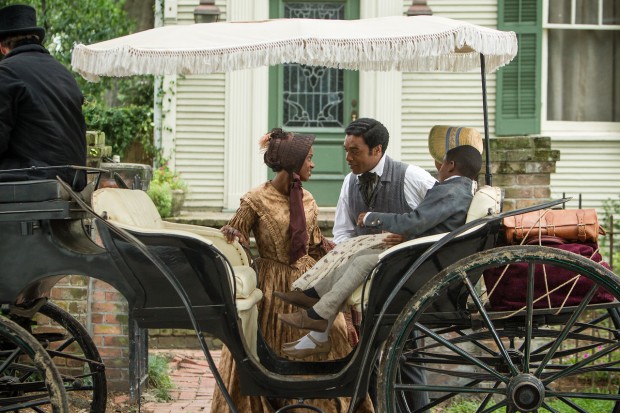Five minutes after I’d left the cinema in which I’d just watched Steve McQueen’s new film 12 Years A Slave an African American man approached me and asked ‘Do you speak to black people?’. At first I thought he was one of many crazy people who talk to strangers that I’d encountered during my time here in New York, but after I’d answered to the certain affirmative and he’d launched into a pitch trying to sell me tickets to a comedy club, I realised the initial question was genuine. He’d asked as a result of prior rejection of the colour of his skin.
It’s been almost a year since the release of Quentin Tarantino’s Django Unchained, the last high-profile film about the devastating slavery trade, which was only abolished in America in 1865. Tarantino’s film, despite the protestations of the director, was light entertainment, and the association between slavery and over the top violence and comedy was often unharmonious. Regardless of apparently similar subject matter, 12 Years A Slave is a very different beast to Django Unchained, and as a result is one of the most brutally realistic films about slavery I’ve ever seen.
The film follows Solomon Northup, a family man and an accomplished violinist, living in Saragota, New York. Before long, Northup is tricked, kidnapped and sold into slavery. He protests his freedom, but those protests are swiftly and brutally beaten out of him. Northup is shipped off to the American South, effectively rendering escape impossible. Over the next twelve years, he is bought, traded, beaten and abused, until little of the original gentleman is left, save a quiet dignity.
McQueen, despite being proficient in many areas of filmmaking, is not a natural storyteller. The film is not a subtle one. The era was undoubtedly just as awful as McQueen depicts it here, perhaps worse, but there are shots that linger for so long the effect is significantly diminished, and so many instances of cruelty towards slaves that 12 Years a Slave sometimes feels more like a series of distressing episodes than a complete film. I was also surprised to discover that many characters and events from Northup’s original autobiography (the film is based on a true story) have been altered or omitted whereas perhaps the truth (or as close to it as can be fit into a feature length film) might have been more powerful. It’s an affecting film, but like Mel Gibson’s The Passion of the Christ, the impact stems more from witnessing horrible things happen to people than anything the filmmaker is conveying.
There is little evidence that more is being suggested than the surely obvious fact that slavery was and still is a horrible thing. No insight is offered into any of the characters nor indeed into slavery and how these plantation owners can treat human beings in such an inhumane manner. Benedict Cumberbach’s Ford is arguably the most intriguing character in the film, simultaneously empathetic and callous, but he is quickly glossed over in favour of the more two-dimensional Epps (Michael Fassbender). Fassbender does admirably with a role that offers him little more than a chance to convey malevolent tyranny. I’m sure there were more than plenty of men like Epps during the slavery era, but again we are offered no clue as to how he can justify behaving the way he dies, other than a few mentions of ‘property’ and comparisons between his slaves and animals.
Chiwetel Ejiofor is the perfect choice for Solomon Northup, concurrently projecting extreme distress and resolute dignity. Ejiofor has an incredibly expressive face, capable of sincere warmth and intense anger. Without Ejiofor’s performance, the film would have been far worse. Fassbender and Cumberbach as the two plantation owners Northup spends the majority of his time with are also strong, despite the limited development of both characters. Paul Dano has unfortunately been offered such a long string of irritatingly whiny characters that nowadays his face is enough to inspire annoyance. I would have been more than happy for Solomon to pull a Django on him.
There is no real point to 12 Years a Slave, which is ultimately its greatest weakness. It’s not enough to show us how horribly brutal slavery was without offering any comprehension or perception. Individual scenes shine, as do performances, but as a whole 12 Years a Slave is not as strong as the sum of its parts. McQueen is a slick filmmaker, and there is much to be admired, particularly technically. But I have the distinct impression that the impact of the film was forced upon me. A film about something horrible and brutal need not always be a horrible and brutal experience itself. For such a compelling subject matter, I left the cinema with little to think about. Until that man selling comedy tickets approached me on the street and I realised men who feel the same way as Fassbender’s Edwin Epps still exist out there.

